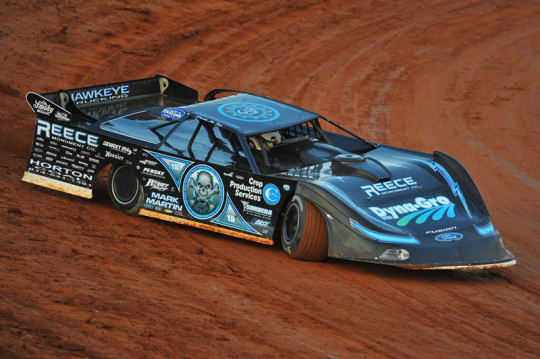For a few brief moments on Saturday night, it appeared as if Scott Bloomquist had won his seventh Dirt Late Model Dream at the Eldora Speedway. The Mooresburg, Tenn. driver was first to the checkered flag on the half-mile dirt track but his car weighed in 25 pounds too light on the scales and his apparent win was disallowed.
Ultimately, Jonathan Davenport, who had come to the finish line second, was declared the victor and the recipient of the $100,000 first prize.
I realize that the title of this column offers the opportunity for racing fans to criticize because The Dirt Late Model Dream is not sanctioned by NASCAR, nor will it ever be. However, the purpose of this piece is to editorialize the differences in how NASCAR and dirt racing handle post-race tech failures.
For the sake of comparison, Kasey Kahne was first to the finish line in a NASCAR Camping World Truck Series event at the Charlotte Motor Speedway last month. However, his JR Motorsports machine failed its post-race inspection when officials found the ride heights to be out of compliance on three of its four corners.
JR Motorsports crew chief Joe Shear, Jr. was fined $6,000 and placed on probation for the remainder of the year. Also, the team had 10 points taken away from their total in the owner standings, which had no real impact on a team that is not seriously vying for an owner’s championship in that series.
There were no fines or point deductions for Bloomquist when his car proved to weigh less than required. For all intents and purposes, it was almost as if Bloomquist wasn’t even there except that he paid an entry fee and drove around the track. He received last place prize money, was given no trophy, and earned no points whatsoever.
Of course, it must be pointed out that The Dream is essentially unsanctioned(yes, I know the race is administrated by DIRTcar) in that the drivers who were competing for the win race full-time in other series. In other words, the money and prestige mean everything and points mean nothing when drivers make the trek to Tony Stewart’s track in Rossburg, Ohio.
The penalty for failing Dirt Late Model racing’s biggest event is as severe as possible. In comparison, the penalty levied against Kahne and JR Motorsports was basically a non-penalty.
In the view of this writer, there is no point in having rules if those rules are not going to be enforced from start to finish. While I certainly don’t enjoy seeing drivers get disqualified and have wins taken away, it has to be understood that a car which does not comply with the rules is, by definition, not in the same “class” as those in compliance with the predetermined rules. To allow that car to keep a win is essentially the same thing as allowing a Sprint Cup car to win an Xfinity race.
I do not believe Bloomquist intentionally violated the weight rule at Eldora. If someone were going to cheat in a Dirt Late Model race, that would be the most foolish way to do it because it is widely known that the first place the winning machine is going to go after crossing the finish line is to the scales.
Ultimately, however, it doesn’t matter whether the violation was intentional or not, it was still a violation.
Whether Kahne’s violation was intentional or not, it was still a violation. There wouldn’t be a rule stating the prescribed ride heights of the car if those heights didn’t make a difference. To win a race with a car out of compliance and not suffer any real penalty diminishes the legitimacy of the event.
Had Bloomquist’s win been allowed to stand, The Dream wouldn’t have the same meaning. And this was not the first time such an infraction had been found and was similarly penalized. In 2005 Dale McDowell won the World 100(Eldora’s other big dirt Late Model race) after Shannon Babb was disqualified in post-race for a weight issue.
In NASCAR, the same type of situation as occurred in the CWTS race in Charlotte seems to happen often in all three of the sport’s top divisions(CWTS, Xfinity, Sprint Cup). Yes, fines and points sanctions can be severe, but winning the race is the thing that garners the most attention for highly coveted sponsors. And the driver and team who truly won the race by the rules should be entitled to that attention.
Again, what’s the point of having rules if a car and driver are going to be allowed to keep wins when they are out of compliance?






